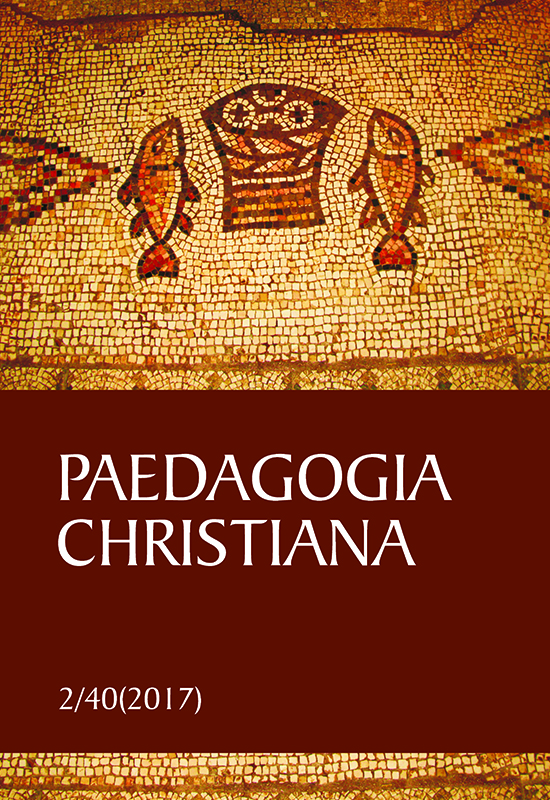Reflexion as a Ground for Empowerment. Following Paulo Freire’s Anthropology
DOI:
https://doi.org/10.12775/PCh.2017.030Keywords
Paulo Freire, the awakening of conscience, identity, anthropology, educationAbstract
The article deals with a question of reflexion as a condition for the awakening of human empowerment, in Paulo Freire’s anthropological view. The awakening of conscience as one of the key concepts worked out by the Brazilian pedagogue, is conceived here as the awakening of human empowerment. A subject is a person who understands culture in which he/she lives and with which he/she establishes relationships. The opposite attitude characterizes a person who believes that he/she is a mere passive element of nature. A difference between nature and culture, as defined by Freire, is also analyzed in the text. Then, the value of education as the main factor contributing to the awakening of conscience is shown. The article is concluded with a short presentation of the multi-layered Freirean inspirations for pedagogy.
References
Czerepaniak-Walczak, Maria. Pedagogika emancypacyjna. Rozwój świadomości krytycznej człowieka. Gdańsk: GWP, 2006.
Fenon, Frantz. Wyklęty lud ziemi. Tłum. Hanna Tygielska. Warszawa: PIW, 1985.
Freire, Paulo. Cultural Action for Freedom. Harmondsworth: Penguin, 1972.
Freire, Paulo. Education for Critical Consciousness. New York: Continuum, 1980.
Freire, Paulo. Letters to Cristina. Reflections on My Life and Work. New York and London: Routledge, 1996.
Freire, Paulo. Pedagogy in Process. The Letters to Guinea-Bissau. New York: The Seabury Press, 1978.
Freire, Paulo. Pedagogy of Hope: Relieving Pedagogy of the Oppressed. New York: Continuum, 1994.
Freire, Paulo. Pedagogy of the City. New York: Continuum, 1993.
Freire, Paulo. Pedagogy of the Oppressed. London: Penguin Books, 1972.
Freire, Paulo. The Politics of Education. Culture, Power, and Liberation. Houndmills, Basingstoke, Hampshire and London: Macmillan Publishers Ltd, 1985.
Kostyło, Hanna. „Dwa sposoby (rozumienia) alfabetyzacji”. Kultura i Edukacja 1 (2010): 58–69.
Kostyło, Hanna. „Przesłanie ‘Pedagogii uciśnionych’ Paula Freire”. Forum Oświatowe 2 (2011): 7–26.
Rudnicki, Paweł. „Działanie jako forma oporu wobec ideologii dominujących: o (nie)skuteczności radykalnej myśli pedagogicznej”. W: Władza, sens, działanie: studia wokół związków ideologii i edukacji, red. Paweł Rudnicki, Marcin Starnawski, Mirosława Nowak-Dziemianowicz, 407–428. Wrocław: Wydawnictwo Naukowe Dolnośląskiej Szkoły Wyższej, 2012.
Stańczyk, Piotr. „Pedagogika radykalna Paulo Freire wobec różnic społecznych: rzecz o edukacji ludowej”. Człowiek – Teraźniejszość – Edukacja 1 (2016): 37–51.
Tischner, Józef. „Teologia wyzwolenia a etyka solidarności”. W: Józef Tischner, Etyka solidarności. Homo sovieticus, 214–230. Kraków: Znak, 2005.
Zielińska, Hanna. „Dialog Martina Bubera z Paulo Freire”. W: Zaufanie i zrozumienie. Verständnis und Vertrauen, red. Friedrich W. Busch, Piotr Petrykowski, 79–87. Toruń: Universitas Nicolai Copernici; Oldenburg: Carl von Ossietzky Universität Oldenburg, 2001.
Zielińska, Hanna. „Freirowska koncepcja edukacji w sytuacji zmiany społecznej”. W: Edukacja alternatywna, nowe teorie, modele badań i reformy, red. Jacek Piekarski, Bogusław Śliwerski, 27–45. Kraków: Impuls, 2000.
Zielińska, Hanna. „Noam Chomsky o antyedukacyjnej funkcji globalnej amerykanizacji”. Forum Oświatowe 2 (2001): 5–32.
Zielińska, Hanna. „Paulo Freire i jego rozumienie sytuacji edukacyjnej”. W: Nieobecne dyskursy, t. VI, red. Zbigniew Kwieciński, 215–230. Toruń: UMK, 2000.
Zielińska-Kostyło, Hanna. „Humanistyczne źródła pedagogiki emancypacyjnej”. AUNC. Socjologia Wychowania 360 (2003): 185–196.
Zielińska-Kostyło, Hanna. „Pedagogika emancypacyjna”. W: Pedagogika. Podręcznik akademicki, t. I, red. Zbigniew Kwieciński, Bogusław Śliwerski, 394–414. Warszawa: PWN, 2003.
Zielińska-Kostyło, Hanna. Rekonstrukcjonistyczne koncepcje zmiany społecznej poprzez edukację. Antropologia pedagogiczna T. Bramelda. Toruń: Wydawnictwo UMK, 2005.
Downloads
Published
How to Cite
Issue
Section
Stats
Number of views and downloads: 766
Number of citations: 0



